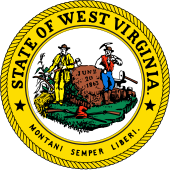West Virginia State Legislature
| West Virginia Legislature | |
|---|---|
 |
|
| Type | |
| Type | |
| Houses |
Senate House of Delegates |
| Leadership | |
|
Senate Majority Leader
|
|
|
House Majority Leader
|
|
| Structure | |
| Seats |
134 voting members: 34 Senators 100 Delegates |
 |
|
|
Senate political groups
|
Republican (22) Democratic (12) |
 |
|
|
House of Delegates political groups
|
Republican (64) Democratic (36) |
| Authority | Article VI, West Virginia Constitution |
| Elections | |
|
Senate last election
|
November 8, 2016 |
|
House of Delegates last election
|
November 8, 2016 |
| Meeting place | |
 |
|
| West Virginia State Capitol, Charleston | |
| Website | |
| wvlegislature |
|
Republican (22)
Republican (64)
The West Virginia Legislature is the state legislature of the U.S. state of West Virginia. A bicameral legislative body, the Legislature is split between the upper Senate and the lower House of Delegates. It was established under Article VI of the West Virginia Constitution following the state's split from Virginia during the American Civil War in 1863. As with its neighbor and former constituent Virginia General Assembly, the legislature's lower house is also referred to as a "House of Delegates."
The Legislature convenes in the State Capitol building in Charleston.
Senators are elected for terms of four years and delegates for terms of two years. These terms are staggered, meaning that not all 34 State Senate seats are up every election: some are elected presidential election years and some are up during midterm elections.
Regular sessions of the Legislature commence on the second Wednesday of January of each year. However, following the election of a new governor, the session starts in January with the governor's address but then adjourns until February. On the first day of the session, members of both the House and the Senate sit in joint session in the House Chamber where the governor presents his or her legislative program. The length of the general session may not go beyond 60 calendar days unless extended by a concurrent resolution adopted by a two-thirds vote of each house. The governor may convene the Legislature for extraordinary sessions. Given the part-time nature of the legislature of West Virginia, multiple extraordinary sessions are not uncommon.
...
Wikipedia
